Cancun REDD Wrap
Air Date: Week of December 10, 2010
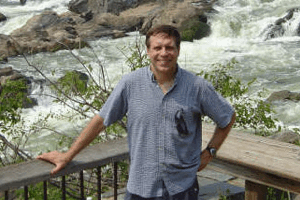 |
It was only a modest agreement without binding emission limits at the 16th UN climate summit that just wrapped up in Cancun, despite the urgency of changing weather patterns. There was progress on the scheme to lock up carbon in trees, called REDD, but as Living on Earth’s team in Cancun reports, stumbling blocks remain.
Transcript
CURWOOD: From the UN Climate Summit in Cancun, Mexico, this is Living on Earth. I’m Steve Curwood.
GELLERMAN: And I’m Bruce Gellerman.
ANNOUNCER: Ladies and gentleman the president of the Mexican United States…
[MUSIC]
GELLERMAN: The pomp and security was what you’d expect under the circumstances - delegations from more than 190 nations had come to Cancun to deal with a planetary crisis, climate change. But security was so strict that many who had planned to attend the first day session were stuck in a two-hour checkpoint traffic jam. But by the end of the first week of the conference, many had found their way to see Mexican President Felipe Calderon talk about the importance of forests in the fight against climate change. Calderon got a standing ovation.
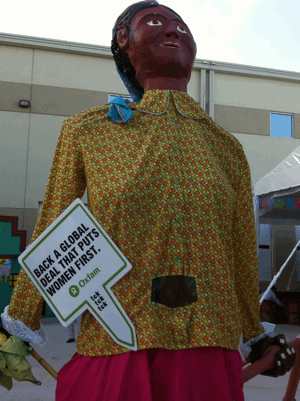
Oxfam encourages delegates to consider the needs of women. (Photo: Jennifer Stevens)
[SPEAKING IN SPANISH]
GELLERMAN: President Calderon told the crowd, “We have to change the way we do things or climate change will change us.” Two-dozen heads of state and governments attended the Cancun summit but one was conspicuously absent.
[CROWD CHANTING “Obama, Obama…respect Cohcibama…”]
GELLERMAN: Peasant farmers and their supporters held a press conference and demonstration to protest the UN climate talks, calling on U.S. President Barack Obama to stand up for indigenous rights, fearful that a negotiated treaty to curb greenhouse gases would come at the expense of those who had protected the environment for so long, but had profited the least.
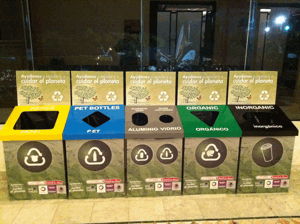
Recycling at COP16. (Photo: Jennifer Stevens)
In the wake of the failure of the last year’s climate talks in Copenhagen to reach a binding agreement, UN Secretary General Ban Ki-Moon told delegates in Cancun, time is running out.
BAN KI-MOON: We are here for one reason, to protect people and the planet from the uncontrolled climate change. Nature will not wait while we negotiate. The time for waiting while keeping one eye on everyone else is over.
GELLERMAN: Time is also running out for the UN climate conference process itself. This is the 16th COP or Convention of the Parties - the 16th annual meeting where the nations of the world have tried to seal a deal on greenhouse gas emissions and their effects. It’s a process that requires consensus by all 190-plus countries attending the meeting. Duncan Marsh is Director of International Climate Policy with The Nature Conservancy.

Duncan Marsh is Director of International Climate Policy at The Nature Conservancy. (The Nature Conservancy)
MARSH: We are facing the risk that countries are going to walk away from this process under the UN to deal with climate change, and that’s not optimal. For a global problem like climate change, we need a global solution where all nations are acting together.
GELLERMAN: Unlike the high expectations for last year’s climate meeting in Copenhagen - where a final agreement was anticipated - the hopes for the talks here in Cancun were decidedly lower, designed to shore up confidence in the UN process, building on the one issue where negotiators had worked out most differences, REDD, the UN mechanism for reducing emission from deforestation and degradation, putting a price on the carbon in trees so they’re worth more left standing than cut down. Rosalind Reeve is head of the forest team at London based NGO Global Witness.
REEVE: It really felt as if everybody engaged in REDD was converging toward one point, that we really were coming toward a consensus, but that consensus seems to be somewhat fractured.
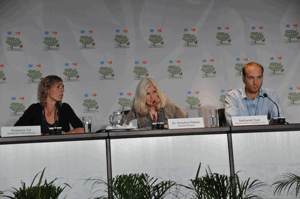
Rosalind Reeve is head of the forest team at Global Witness. (Photo: Jennifer Stevens)
GELLERMAN: An agreement on REDD was on the fast track in Cancun- stopping deforestation and replanting trees is considered the quickest way to reduce climate changing gases. It’s an amount equal to that emitted by all the vehicles in the world. REDD is especially important for countries like Indonesia, home to the world’s third largest tropical forest. Kuntoro Mangkusubroto, head of Indonesia’s REDD program, cautioned climate negotiators to slow down and get the complex REDD mechanism right.
MANGKUSUBROTO: We are introducing a new paradigm of development, so although we want this to happen very fast in Indonesia, we have to be very careful.
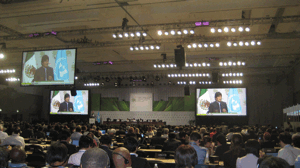
Bolivian President, Evo Morales at COP 16. (Photo: Jennifer Stevens)
GELLERMAN: Potentially at stake is hundreds of billion dollars in REDD forest credits. Many Indigenous groups and nations including Bolivia and Cuba oppose turning the carbon in trees into a commodity that can be bought and sold to offset industrial emissions. They believe developed nations should cut their greenhouse gases first, but supporters of a market based mechanism say it’s the only way to raise enough money to fund REDD. For billionaire financier George Soros, there’s gold in them thar trees.
SOROS: It has to be preservation, but it has to be a model of economic development, so I'm ready to invest in it and I think private enterprise has to play a major role.
GELLERMAN: Among nations Norway is the biggest supporter of REDD. It’s put more than two-billion dollars on the table for the forest-saving scheme, funding it with revenues from North Sea oil. Jens Stoltenberg, Prime Minister of Norway, says the nation’s leaders have also paid a high cost in political capital as well.

A call for a treeless Christmas from Greenpeace at the UN Climate convention. Deforestation releases as much carbon as all the world's vehicles combined. (Photo: Bruce Gellerman)
STOLTENBERG: We are a major oil exporter but we tax petroleum extremely high, and it’s hard to win elections based on a message of high taxation, so therefore I am very much dependent on success to show Norwegian voters that they are getting something back.
GELLERMAN: A major sticking point in the REDD negotiations in Cancun was verification. Donor nations want to make sure the carbon locked in trees - stays in the forests. Norway says it gave 250 million dollars to the world bank to fund REDD programs in Guyana, but Bharrat Jagdeo, President of the South American nation, says Guyana saved the trees- now show it the money.
JAGDEO: We have decided we have taken the tough political decision to pledge our entire forest, with the hope that we’ll get money or assistance to develop alternatives, and frankly speaking we have not seen a single cent.

Climate delegates have a bone to pick with COP 16. (Photo: Jennifer Stevens)
GELLERMAN: Success for the climate talks in Cancun will be measured incrementally, when the UN looks to the summit next year in Durban, South Africa. And, as the Cancun meeting wound down, Roslind Reeve of Global Witness reflected on the speed of the process.
REEVE: What’s important is that we get the rules right. It’s better to wait than have a bad deal here.
Living on Earth wants to hear from you!
Living on Earth
62 Calef Highway, Suite 212
Lee, NH 03861
Telephone: 617-287-4121
E-mail: comments@loe.org
Newsletter [Click here]
Donate to Living on Earth!
Living on Earth is an independent media program and relies entirely on contributions from listeners and institutions supporting public service. Please donate now to preserve an independent environmental voice.
NewsletterLiving on Earth offers a weekly delivery of the show's rundown to your mailbox. Sign up for our newsletter today!
 Sailors For The Sea: Be the change you want to sea.
Sailors For The Sea: Be the change you want to sea.
 The Grantham Foundation for the Protection of the Environment: Committed to protecting and improving the health of the global environment.
The Grantham Foundation for the Protection of the Environment: Committed to protecting and improving the health of the global environment.
 Contribute to Living on Earth and receive, as our gift to you, an archival print of one of Mark Seth Lender's extraordinary wildlife photographs. Follow the link to see Mark's current collection of photographs.
Contribute to Living on Earth and receive, as our gift to you, an archival print of one of Mark Seth Lender's extraordinary wildlife photographs. Follow the link to see Mark's current collection of photographs.
 Buy a signed copy of Mark Seth Lender's book Smeagull the Seagull & support Living on Earth
Buy a signed copy of Mark Seth Lender's book Smeagull the Seagull & support Living on Earth

